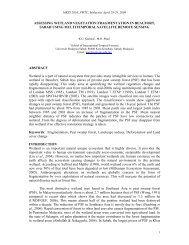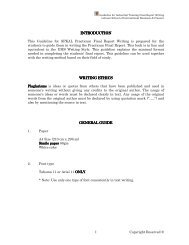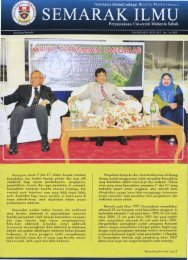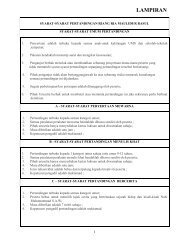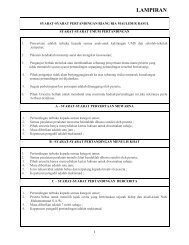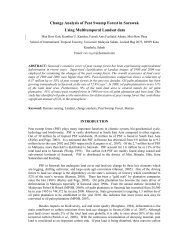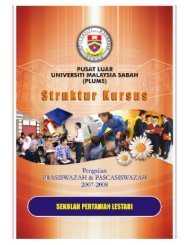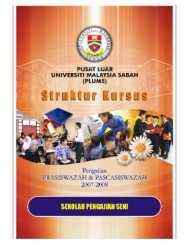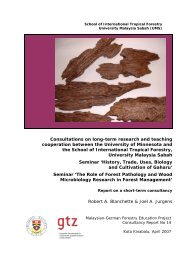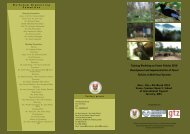Report for the German Agency for Technical Cooperation (GTZ) - UMS
Report for the German Agency for Technical Cooperation (GTZ) - UMS
Report for the German Agency for Technical Cooperation (GTZ) - UMS
Create successful ePaper yourself
Turn your PDF publications into a flip-book with our unique Google optimized e-Paper software.
staff). They try to develop national demonstration objects. CBD should be part of <strong>the</strong><br />
project as well. Location: Borneo, Berau district. Size: 971,000 ha. Emissions reductions:<br />
5 MtCO2e per year. Project activities: Forest management, wildlife protection, local<br />
economic development, capacity building, land use planning, habitat conservation, carbon<br />
offset sales. Co-benefits: Water resource protection, food security, financial growth.<br />
Partners: indigenous groups, government agencies, The Nature Conservancy and o<strong>the</strong>r<br />
international NGOs, local and global businesses. Description: Logging, mining and <strong>the</strong><br />
rapidly growing oil palm industry are killing off <strong>the</strong> <strong>for</strong>ests of Indonesia faster than<br />
anywhere else on earth. The destruction of <strong>the</strong>se <strong>for</strong>ests produces 80 percent of<br />
Indonesia’s carbon emissions, placing it among <strong>the</strong> world’s top emitters of climate<br />
changing greenhouse gases, alongside. <strong>the</strong> United States and China.<br />
• <strong>GTZ</strong> and Global Eco-Rescue GER: Balikpapan/Malinau District: (economic level, profit<br />
agreement). GER has already expended 89,000 Euros <strong>for</strong> <strong>the</strong> preparation of a proposal<br />
<strong>for</strong> <strong>the</strong> Malinau <strong>for</strong>est (89,000 ha). REDD will be implemented in Malinau (pilot project). At<br />
least three districts are needed <strong>for</strong> <strong>the</strong> REDD research.<br />
• Fauna & Flora International FFI (Frank Momberg). Aceh and West Kalimantan. Funded<br />
also by USAid (not definitive). “Fauna and Flora International and Australia’s Macquarie<br />
Group have signed a deal to invest in six Redd projects globally, three of <strong>the</strong>m in<br />
Indonesia. Two are in West Kalimantan, on Borneo island, <strong>for</strong> which memorandums of<br />
understanding (MOUs) have been signed with <strong>the</strong> local government and <strong>the</strong> third is in<br />
Papua province on New Guinea island. The o<strong>the</strong>r three projects are in Cambodia, Liberia<br />
and Ecuador.” (conservation)<br />
• WWF: Heart of Borneo: Network Initiative (SFM, freshwater, biodiversity, strategies <strong>for</strong><br />
adaptation. It has a co-operation with <strong>the</strong> Ministry of Forestry Indonesia (Directorate<br />
General of Forest Protection and Nature Conservation). Surin Suksuwan WWF assumes<br />
that no strategies have been drawn up yet (conservation;<br />
http://www.panda.org/about_wwf/where_we_work/asia_pacific/our_solutions/borneo_<strong>for</strong>es<br />
ts/).<br />
• WWF and Tropenbos: Forest partnership: from Kalimantan districts to <strong>the</strong> global market<br />
place (http://www.asia<strong>for</strong>ests.org/files/_ref/about/activities/workplan/wp_kalimantan.htm.<br />
Time frame: 2 years (July 2004 – June 2006) with possible extension of 3 years (July<br />
2006 – June 2009).<br />
• Center <strong>for</strong> Tropical Forest Research PPHT and JICA (Japan International <strong>Cooperation</strong><br />
<strong>Agency</strong>, comparable to <strong>GTZ</strong>-<strong>German</strong>y). Aboveground biomass and carbon stock in<br />
Acacia plantations in East Kalimantan. JICA will use <strong>the</strong> ALOS PALSAR-Satellite System.<br />
• JICA: Bornean Biodiversity and Ecosystems Conservation BBEC (long running, focus on<br />
Sabah). Phase II from October 2007 through September 2012. Aims to support <strong>the</strong><br />
implementation of <strong>the</strong> Sabah Biodiversity Enactment 20001 in order to achieve a balance<br />
between development and conservation by linking conservation activities and decisionmaking<br />
process. (http://www.bbec.sabah.gov.my/index.asp).<br />
• Forest Based Carbon FBC Network Initiative: Input to <strong>the</strong> Kyoto Protocol, aim <strong>for</strong> REDDpilot<br />
projects, still being developed, multi country ef<strong>for</strong>t, Ivy Wong (iwong@wwf.org.my).<br />
• Winrock International (will start in March): Carbon stock identification: Oil palm,<br />
community areas. Winrock International, Sandra Brown (East Kalimantan).<br />
• BAKOSURTANAL. There already exists a partnership of Bakosurtanal within <strong>the</strong> project<br />
“Forest Degradation and Vegetation Mapping in East Kalimantan” (including Sabah) by<br />
Dr. Kitayama and Dr. Tay (since last year?). The project “Land cover change in South<br />
Kalimantan” by Bakosurtanal starts now (three years by 25,000 $/year). It is expected to<br />
be extended.<br />
12



